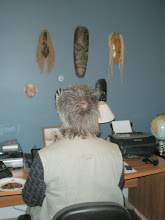I've mentioned this dude named Richard Peabody who published a book called "The Common Sense of Drinking" in the early 1930s. He was the first guy to propose that there was no cure for alcoholism and he was a big influence on Bill W. I like the fact that so much of The Program was gleaned from other sources. Bill was the practical one. I get the sense that Dr. Bob brought a lot to the table in the spiritual realm - he had a library full of religious and spiritual books that he read voraciously.
I came across these passages in Peabody's book - see if there is any hint of our written inventory, our Fourth Step, in here . . .
"Keeping a notebook is another helpful way of objectifying the work. He copies into his notebook those ideas which he has marked in the books that he has read. Thus he creates a personal reference book which should stimulate him by precept, warning, or inference toward better control and more mature behavior. This book he should turn to frequently for the purpose of refreshing his mind with his new system of philosophy and as a means of correcting any negative suggestion which he may have absorbed."
Write. Write and review what you have written. Something happens when we write. We're generally honest - it makes little sense to lie when you're the only person who's going to see the writing - and our pens take odd, surprising detours, leading us to revelations that are unexpected. We are liberated.
On the potential for relapse which is addressed repeatedly in The Big Book and the 12 & 12.
"In the beginning he is particularly apt to get good results, because, although e is very near to the latest expression of the habit he is endeavoring to conquer, the treatment is colored with novelty and enthusiasm. When this wears off, as it is bound to do, he may become lazy and uninterested if he has not taken pains to prepare his future mental attitude, though the method that this laziness will take will be a premature conviction that he is already cured. Experience has shown that relapses come about in this way and not because of the accumulation of an irresistible thirst through a period of abstinence. As a matter of fact, in no case yet where a relapse has occurred has the patient told me that it resulted from overwhelming temptation in spite of conscientious work. In each and every instance it was frankly admitted that the carrying out of the therapeutic measures had been allowed to slacken some time before a drink was actually taken."
Keep doing the work. There is no end point. There is no Longtimers Club where you get to smoke cigars and act like assholes or, if there is one, I haven't received an invitation. This is why I always tell people who are celebrating anniversaries that the next year is the hardest. Each year is usually easier but it can get harder to do the work diligently.
On willpower . . .
"Willpower is most decidedly necessary, but after the first month or tow it is used chiefly as a force to compel the patient to carry on his work. If it is blindly directed against the habit itself, however, it can be described as will power fighting with its bare fists. If it is used in conjunction with writing, it is all the lines of will power armed with an assortment of weapons with which to coerce an errant mind."
Monday, May 25, 2020
Subscribe to:
Post Comments (Atom)

No comments:
Post a Comment